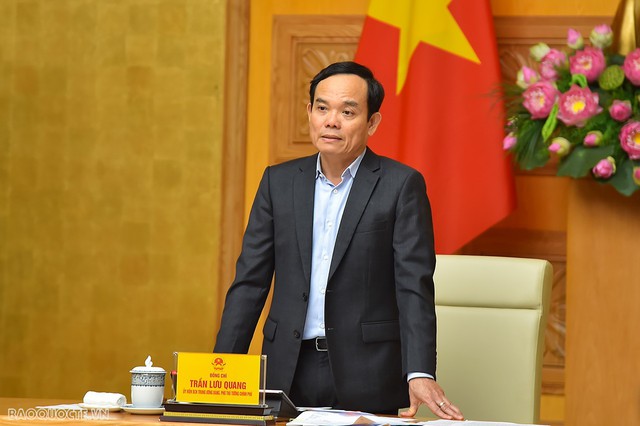Deputy PM Tran Luu Quang to visit Cuba, Venezuela
VGP - Deputy Prime Minister Tran Luu Quang will pay official friendship visits to Cuba and Venezuela from April 14-19.

Deputy Prime Minister Tran Luu Quang
The visits represent Viet Nam's foreign policy of independence, self-reliance, multilateralization, diversification, and proactive international integration in a comprehensive, extensive and effective manner adopted by the 13th National Party Congress.
The visits will see discussions on measures aimed at promoting and deepening relations and effective cooperation between Viet Nam and Cuba, and Venezuela in an effective mnner across multiple fields, making positive contributions to peace, stability, cooperation and sustainable development in the region and the world as a whole.
In Cuba, Deputy Prime Minister Tran is set to make courtesy visits to First Secretary of the Communist Party of Cuba and President of Cuba Miguel Diaz-Canel, along with Prime Minister Manuel Marrero Cruz.
He will also meet with Cuban Minister of Foreign Affairs Bruno Rodriguez Parrilla, have talks with Deputy PM and Minister of Foreign Trade and Investment Ricardo Cabrisas Ruiz, and attend the closing session of the 41st meeting of the two countries' Inter-Governmental Committee.
He is scheduled to visit the Mariel Special Development Zone, some investment projects of Vietnamese businesses there, and the Vo Thi Thang Primary School. He will also engage in a meeting with representatives of the Vietnamese community and the staff of the Vietnamese Embassy in Cuba.
The Cuban visit takes place amid the continually enhanced traditional friendship and increasingly substantive cooperation between the two countries.
The two sides maintain regular delegation exchange at all levels, especially high-level ones, and effectively deploy the mechanisms of the Intergovernmental Cooperation Committee, Defense Policy Dialogue and political consultations at the deputy ministerial level.
Regarding trade cooperation, Viet Nam is Cuba's second largest Asian trade partner, however, bilateral trade exchange remains modest.
The Viet Nam-Cuba Trade Agreement signed in 2018 officially came into effect on April 1, 2020, with many new trade preferential commitments, thereby bringing benefits to businesses of the two countries and creating favorable conditions for import and export activities.
Regarding investment cooperation, Viet Nam is currently the Caribbean nation’s largest foreign investor in Asia. Vietnamese businesses are interested in and gradually expanding investment cooperation in Cuba, especially in the Mariel Special Development Zone in essential consumer goods production, construction materials and renewable energy.
* Viet Nam and Venezuela officially established diplomatic relations in 1989 and set up a comprehensive partnership framework in May 2007. This year marks the 35th anniversary of both nations' diplomatic ties.
During the past 35 years, the traditional friendship and comprehensive partnership between Viet Nam and Venezuela have continued to be strengthened on all three pillars of Party diplomacy, state diplomacy and people-to-people diplomacy. In addition, parliamentary diplomacy and relations between localities of the two countries have also been promoted.
Regarding economics, trade and investment, the two sides have signed more than 50 cooperation agreements across a variety of fields and implemented many cooperation mechanisms and bilateral cooperation projects, especially in agriculture and aquaculture.
Viet Nam's agricultural projects in Venezuela have achieved good results on developing high-yield rice varieties as a contribution to ensuring food security for the South American nation.
Although two-way trade turnover is still modest, with last year's figure of US$31.52 million, there is still a lot of potential for stronger cooperation in the fields of energy, mining, agriculture and tourism./.
